Energy Performance Certificates
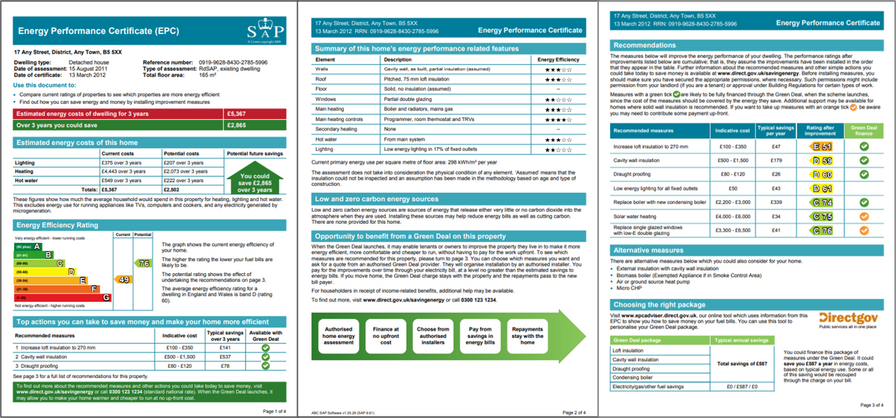
1. What is an Energy Performance Certificate?
Energy Performance Certificates or EPCs are certificates which summarise the energy efficiency of your home. Your home will be awarded a rating between A (very efficient) to G (Inefficient).
The EPC will also include recommendations on ways to improve your homes’ energy efficiency. Making your home more energy-efficient will help you save money because your home will use less energy.
An EPC allows you to compare the energy efficiency of different homes. The EPC also shows how much energy and money you could save by taking action and installing products to improve the energy efficiency of your home.
The EPC will show you the estimated energy costs to run the home for three years. It will also show how much money you could save over the same three year period by installing energy efficiency improvements.
2. When do I need an Energy Performance Certificate (EPC)
You will need an EPC whenever you are selling, renting or building a home for sale. You have to have a valid Energy Performance Certificate before you market your property to either sell or rent in England and Wales. You cannot list your home on property portals without displaying the EPC on the listing.
In Scotland, the EPC must be displayed somewhere in your property, for instance in the meter cupboard or next to the boiler.
You can of course store a digital copy of your Energy Performance Certificate on your Twindig’s digital property logbook
Thinking of selling your home?
If you would like to quickly see how much your house is worth you can do so by visiting twindig.com we have details of every house across the country, all 28 million, not just the one million or so that are currently for sale or rent
3. What does an Energy Performance Certificate (EPC) contain
Your Energy Performance Certificate will contain the following information:
- The address of the property
- The type of property (ie detached house, semi-detached)
- The date of the assessment
- The date the certificate was issued
- EPC reference or certificate number
- The type of assessment: RdSAP or SAP
- The total floor area in square meters
- Estimated energy costs in the home’s current condition
- Estimated energy costs if energy efficiency improvements are made
- The property's current energy efficiency rating
- The property's potential energy efficiency rating
- The top actions you can take to both save money and make your home more efficient – the estimated cost of these actions and the savings and whether they are available under the Green Deal.
- A summary of the energy performance of your home’s: walls, roof, floor, windows, main heating (ie boilers, radiators, fires), main heating controls, secondary heating (where available), hot water and lighting
- Recommendations to improve the energy efficiency of your home with the indicative cost of the recommendation and the typical annual savings related to the recommendation.
- A list of alternative measure that can be taken to improve the energy efficiency of your home
- The EPC will also show details of who carried out the energy assessment, their name, accreditation number and contact details
- Environmental Impact your EPC will also show how much CO2 your home produces each year and compare that to the average household. The EPC will also indicate how much you can reduce your home’s CO2 emissions by following the recommendations in the EPC
4.How can I find an existing EPC
You can check on the Government’s website if a property has a valid EPC on the Government website Find an energy certificate
The website is the UK Government’s Energy Performance of Buildings Register
You will be asked a couple of questions:
- If the property a domestic (i.e. residential property such as a house or a flat) or a non-domestic property (i.e. a commercial or industrial building)
- You will need to enter the postcode of the property
You can select the specific property from the list of all properties in that postcode. The list shows all valid EPCs and all expired EPCs if a property is not listed that will be because it has never had an Energy Performance Certificate
5. How long do EPCs last?
An EPC is valid for 10 years
6. Example of an EPC
We show below an example of a four page EPC certificate
EPC Certificate Page 1
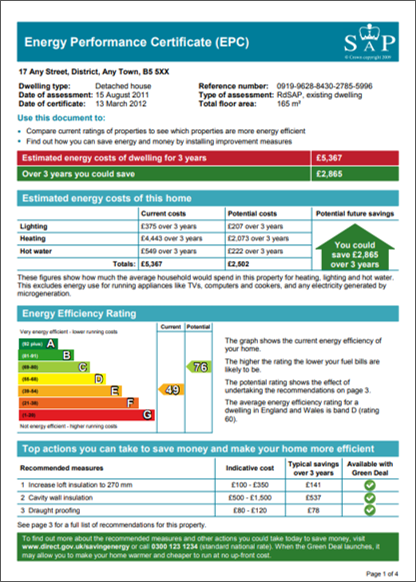
EPC Certificate Page 2
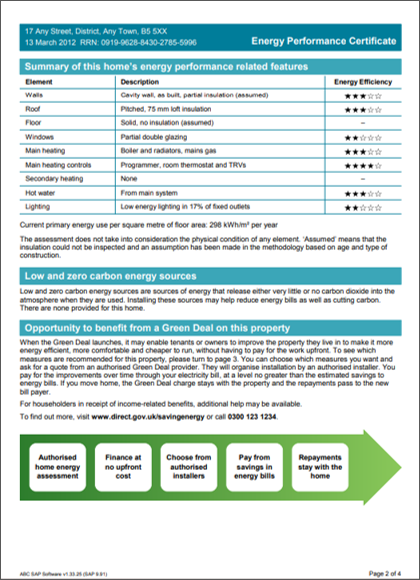
EPC Certificate Page 3
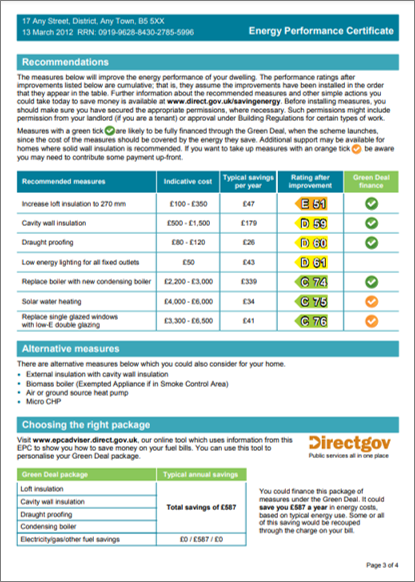
EPC Certificate Page 4
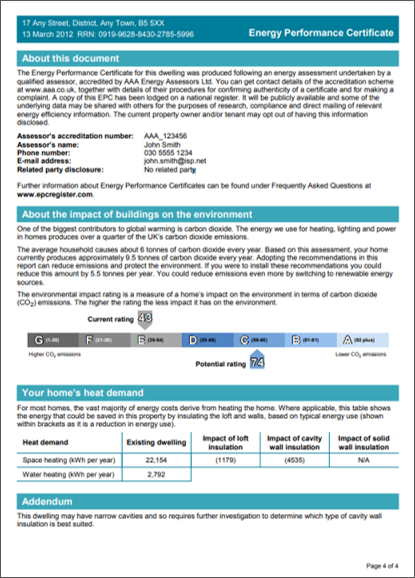
7. Energy Performance Certificate (EPC) Glossary
What is SAP assessment?
The Standard Assessment Procedure (SAP) was designed and developed by the Building Research Establishment for the Department of the Environment in 1992 as a tool to help deliver the UK Government’s energy efficiency policies. SAP is based on the BRE Domestic Energy Model (BREDEM), which provides a framework for calculating a homes energy consumption.
In 1994 SAP was included in Part L of the Building Regulations as a means of assessing a dwelling’s energy performance.
The SAP is often calculated before a home is built to ensure that once built it will comply with current build regulations. To conduct a full SAP you will need detailed information and knowledge of the building materials used in the construction of the home, many of which may not be visible once the home is built.
What does a SAP measure?
The SAP measures how much energy a home will use to deliver a defined level of comfort.
The assessment is based on standardised assumptions for behaviour (i.e. how many hours the heating is on) and occupancy (how many people typically live in a property of this size).
It is assumed that the home will be heated for nine hours a day during the week and for 16 hours a day on Saturday and Sundays, with the living area heated to 21 degrees Celsius and other areas at 18 degrees Celsius.
The SAP quantifies a dwellings performance in terms of:
- energy use per unit of floor area,
- a fuel cost based energy efficiency rating (the SAP Rating) and
- CO2 emissions (the Environmental Impact Rating)
We show an example of an EPC certificate below
What is an RdSAP assessment?
RdSAP is the Reduced Data SAP. It was introduced in 2005 to provide a lower-cost method of assessing the energy usage, consumption and performance of existing dwellings.
The RdSAP is also used because it can be very difficult to accurately assess and determine all the types and quantities of building materials used once a home is built and occupied.
The RdSAP is a non-intrusive way to gauge the energy efficiency of a home, in a similar way that a building surveyor is not allowed to disturb the fabric of a home or cause any damage without the express permission of the owner.
One might worry that a RdSAP EPC assessment is not as accurate as one conducted using SAP, however, this is not the case. Surveys of houses which have had both SAP and RdSAP assessments have found that each method produces very similar results.
There may however be cases where the EPC assessor does not have sufficient access to even complete a RdSAP assessment. In these situations, the assessor records the limitations and the EPC will assume that the property meets the minimum building regulations in force at the time of its construction. This may significantly impact the EPC rating, for instance, if the loft space cannot be inspected the assessor will record that the property has no loft insulation.
An RdSAP is for existing buildings only. Where an EPC is required for a new dwelling under building regulations it must be assessed under the SAP methodology.
Energy Performance of Buildings Register
This is the UK Government website which contains summary details of every Energy Performance Certificate across the country for both residential and commercial buildings. Find an energy certificate
How do I find an EPC Assessor?
The UK Government website has a handy tool to find a list of your local accredited energy assessors. Find an energy assessor
You can search either by postcode of the property requiring the EPC to get a list of all the assessors close by. Or if you know the name of an EPC assessor you can enter their name.
If you choose the postcode option you will be shown a list of all the accredited energy assessors close to the postcode you entered. The list will include their contact details (Phone and email), their assessor ID and details of which accreditation scheme they are a member of or you can search by name
What is a DEA?
In the context of Energy Performance Certificates, a DEA is a Domestic Energy Assessor
Are EPC assessors regulated?
Energy Performance Certificate assessors have to be a member of an accredited scheme. There are several providers, we discuss the main players below:
Ecmk
Ecmk is a UK Government approved provider of accreditation, training, certification and software which enables domestic energy assessors to deliver EPCS. Emck was incorporated on 18 March 2003. Ecmk’s latest accounts show it had 32 people employed in energy and accreditation services. ecmk website
Elmhurst Energy
Elmhurst Energy is a UK Government approved provider of energy assessment training, software and accreditation. The company was established in 1993 and operates across the UK. Elmhurst’s vision is to become the leading independent provider of building energy rating expertise. Elmhurst Energy’s latest accounts show it had 73 people employed in energy and accreditation services. Elmhurst Energy website
Quidos
Bath based Quidos was established in 2004 and is a UK Government approved provider of energy assessment training, software and accreditation. Quidos’s latest accounts show it had 10 people employed in energy and accreditation services. Quidos website
Stroma Certification Limited
Stroma Certification was established in 2007 and is a UK Government authorised certification provider for both domestic and non-domestic energy assessments in the UK. The Group also offers energy-related services to the UK construction industry. Stroma’s latest accounts show it had 38 people employed in energy and accreditation services. Stroma website